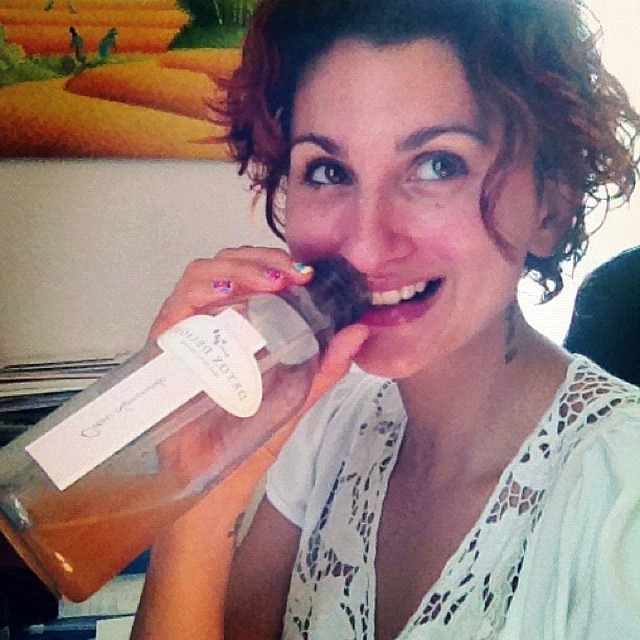Everyone seems to be caught up in the juicing and smoothie craze lately—if Facebook and Instagram are anything to go by.
But juicing isn’t all it’s cracked up to be.
I commonly get questions about the benefits of juicing from friends, family, clients, and followers…basically, just about everyone.
I’m not the biggest fan of juicing or smoothies if they’re not done properly. Juicing and smoothies do have a proper place in our health regimens, but only if we use them correctly.
I’ve seen countless people attempt different types of juice cleanse and smoothie-based diets. At first, they feel an increase in energy, signs of weight loss, and clearer skin, but these results tend to be short lived.
In my experience, juicing alone doesn’t work. If I have a juice or smoothie by itself, my energy radically raises, and then comes crashing down. What most people don’t realize is how much sugar these so-called healthy juices and smoothies are soaking in. Of course, these sugars are derived from healthy sources such as fruits and vegetables, but that doesn’t make them healthy for you.
There’s a difference between eating healthy and eating right for your body. Eating right for your body will include healthy foods, but not every healthy food is right for your body.
Juices and smoothies tend to appear healthy on the outside, but may not be so healthy for your insides. The “healthy” sugars contained in them can drastically and negatively affect your blood sugar, contribute to insulin resistance, weight gain, and hormone imbalances.
Many of the people who come through my health programs are recovering juicers. They fell for the desirably-marketed benefits of juicing, not realizing the associated sugars had taken their bodies on quite the roller coaster ride. They feel so much better once we tame the juice intake and focus on juicing in the right ways and at the right times.
Aside from being loaded with “healthy” sugars that can actually negatively effect our health, there are a number of other reasons juicing doesn’t work in the way it’s often portrayed to.
Here are the top three reasons juicing doesn’t work, and what we should be on the lookout for to make sure we get the most out of our juices or smoothies:
1. Juice lacks protein.
This is the biggest problem with juicing, especially if we’re using it to detox or cleanse our bodies. There are three phases our bodies go through during the detox process, and proteins are essential in order for phase two to happen. If we aren’t getting enough protein, our bodies can’t use the detoxifying nutrients in juice adequately.
Most juice cleanses have us cut out proteins and other food sources, leaving us lacking the required proteins for detoxification to run its course. To get the full benefits of juicing, we have to make sure we’re eating our proteins, too.
2. Not all juices are created equal.
If we’re going to juice, we’d better do it organically—otherwise it’s just not worth it. Think of it this way: would we drink dirty water? Probably not, so why would we drink non-organic juice contaminated with pesticides and toxins?
Not all juice bars, and certainly not all juices found in the grocery stores, are organic. There are a lot of juice bars that don’t even offer organic as an option—or we have to ask and pay a premium for it, which is well worth it! And store-bought, pre-made juices—even the organic ones—can contain all kinds of preservatives.
Drinking non-organic juice defeats the purpose. It exposes us to more toxins, and non-organic produce also contains less vitamins and nutrients than organic. If we’re going to juice, we should go for fresh and organic, or pass!
3. Loss of nutrients.
Ever notice how a piece of cut fruit almost immediately starts to turn brown? This is called oxidation—when the cells begin to become damaged and die off, losing their nutrient value. The same happens to juices if they are not consumed right away. So, that $15 juice we’re buying that was juiced yesterday has less nutrient value than we think. Warm-pressed juices lose their nutrient value within a few hours (commonly the pre-packaged store bought kind) and cold-pressed juices maintain their value up to 48-72 hours.
So, if we’re receiving our juices ahead of time for a three to five day cleanse then, by the time we drink them, they have lost most of their cleansing properties and value. If we’re going to juice, we should make sure it’s made on the spot or pick it up pre-bottled early in the morning and drink it asap.
To sum up in three simple steps, to make juicing work, make sure you:
>> Pair your juice with protein to maximize detoxing benefits.
>> Go organic to minimize exposure toxins and maximize nutrients or pass it up.
>> Get it fresh and cold-pressed to ensure its health benefits.
If you have the time and energy to make your own fresh, high quality juice, then it may be a great addition to your daily routine. But, for many busy people, it is simply more effort than it’s worth, and doing it the wrong way just creates more potential health hazards than health solutions.
If we want to improve our health, it’d be better to start with healthy, organic whole produce and save ourselves the headache!
~
Relephant read:
4 Things You Should Know About Your Morning Lemon Water.
~
Author: Jenn Malecha
Image: Ausdruckslust.de/Flickr
Editor: Khara-Jade Warren
Copy Editor: Nicole Cameron
Social Editor: Leah Sugerman









Read 0 comments and reply